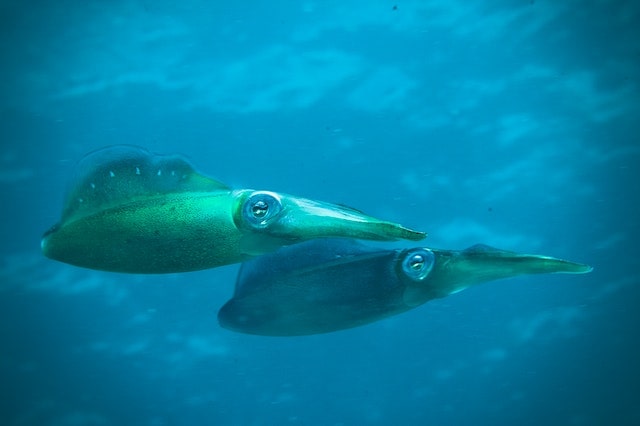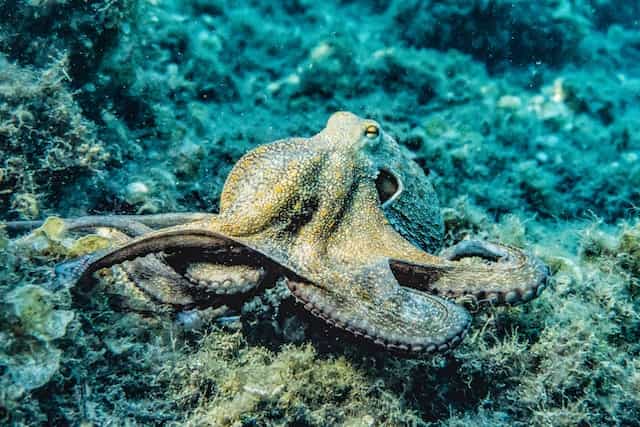The ocean is filled with creatures of different sizes and colours, and some have a unique instinct for survival and hunting. Squid and octopus are cephalopods with similar physical traits but is there a difference between a squid vs octopus?
Squid and octopus share the ocean as their habitat. Both squid and octopus have eight arms and their ability to camouflage in their environment is why they are considered to have a high level of intelligence.
While octopuses navigate the sea floor with their limbs, squids are excellent swimmers known for their rapid swimming skills.
Stay with us as we will be discussing the differences between squid and octopus.
What Is a Squid?
A squid is a mollusc known for its distinct head, elongated soft body, eight arms, two tentacles, and large eyes. Squids are cephalopods found in oceans and sea floors where they hunt prey with their two longer tentacles.
Just like octopuses, squids are mainly soft-bodied. However, they have a small internal skeleton in the form of a pen.
There are about 300 known species of squids. Some species of squids are bioluminescent, while other species can eject a cloud of ink when threatened by predators.
Squids are among the most intelligent invertebrates roaming the ocean floor. They have the ability to change colours, which is their best attribute to survive predators- like sharks, sea birds, seals, and sperm whales.

Also Read: Pug vs Bulldog: Difference and Comparison
What Is an Octopus?
An octopus is a mollusc of the order Octopoda which consists of some 300 species. Just like squids, Octopuses are found in the ocean floor or the deep sea.
Some notable species of octopus include the mimic octopus- which can change its colour and shape to mimic other animals or the venomous blue-ridge octopus.
Octopuses are bilaterally symmetric with a beaked mouth at the centre of their eight limbs. Octopuses can squeeze through tiny spaces due to their soft body.
They inhabit different regions of the ocean, from coral reefs to seabed and pelagic.
Octopuses use their camouflage to elude predators and they also eject ink when threatened by predators. Naturally, all octopuses are venomous but the most deadly to humans is the blue-ridged octopus.

Squid vs Octopus: Key Differences between Squids and Octopuses
Let’s explore the differences between these invertebrates in terms of their size
Size
Between an octopus and a squid, which is larger in size?
These two invertebrates inhabiting the ocean floor are comparable in size. But we also have to consider that different species of squids and octopuses exist on the ocean floor.
Octopus wolfi, the smallest species of octopus weighs about a gram and is just under one inch in length. The giant Pacific octopus is a larger species that can measure up to 30 feet in length and weigh almost 600 pounds.
The smallest cephalopod is the Thai bobtail squid which measures less than half an inch in length and weighs less than a gram. Then you have the giant squid, a sea creature found in the deepest part of the ocean.
The giant squid is found at the extreme depth of the ocean and they can reach over 43 feet in length, with two huge tentacles and can weigh more than a ton.
Squid vs Octopus: Arms
Squids and octopuses both have eight arms that appear similar. But only when you look closely will you notice the difference.
Octopuses navigate the ocean floor with their arms which contain one or two rows of suckers. Octopuses do not develop sucker rings on the end of their elongated limbs. They use their limbs to grab and hold prey.
On the other hand, squid may have sucker rings or suckers on their limbs. The limbs of some species of squids end in small hooks.
Also Read: Hill vs Mountain: Difference vs Comparison
Squid vs Octopus: Comparison Chart
| Squid | Octopus | |
| Description | A squid is a mollusc known for its distinct head, elongated soft body, eight arms, two tentacles, and large eyes. | An octopus is a mollusc of the order Octopoda which consists of some 300 species |
| Shell | Squids have a stiff structure known as a pen and it acts like a flexible backbone | Octopus do not have a shell or stiff bone |
| Class | Cephalopoda | Cephalopoda |
| Kingdom | Animalia | Animalia |
| Order | Teuthida | Octopoda |
| Anatomy | A standard squid possesses a mantle, two finds, a head, eight arms, and two tentacles with hooks or sucker/sucker rings. | Octopuses have a head, a mantle, and eight, with one or two rows of suckers. |
| Superorder | Decapodiformes | Octopodiformes |
| Species | 298 | 300 |
| Geographical distribution | In salty water of the tropics to the temperate zones | In salty water of the tropics to the temperate zones |
| Lifespan | One to five years up to fifteen years | One to three years up to five years. |
Squid vs Octopus: Habitat
Squids and octopuses may appear similar since they are both cephalopods. But one of the differences between octopuses and squids is their habitat preferences.
Ocean Floor
Octopuses naturally like to live on the ocean floor, especially in dark crevices. They prefer to live in solitude and only get together with others when it is time to mate.
Open Ocean
In contrast, squids naturally prefer to live in the open ocean, especially near the surface of the water. They also like to live at extreme depths of the ocean. They can dive deeper, reaching a depth of 2,000 meters.
Rocks
Octopuses elude predators by hiding around rocks. They also prey on small crustaceans found around rocks.
They have the ability to camouflage in their environment, which is vital for their survival and hunting skills.
Also Read: Slug vs Snail: Difference and Comparison
Seaweed
Squids are usually attracted to seaweed and it is also a perfect place to hide from other sea predators. Seaweed is also the breeding ground for squids. They lay their eggs in seaweed and it also provides a cover for protection for their offspring.
Seafloor
Octopuses also inhabit the seafloor. It’s a place where they usually borrow into sand. This is a perfect habitat for the octopus since it can squeeze through tiny spaces.
Shoals
Unlike the octopus, squids are sociable sea creatures and they protect themselves by organizing groups called shoals.
Shoals provide a safer habitat, one that keeps predators away. It’s also a mode of finding food in the ocean. Also, squids in shoals sometimes flash patterns and change colours to communicate with each other.
Squid vs Octopus: Reproduction
Squids and octopuses are considered to be species excellent at parenting. So, how do octopuses and squids reproduce?
Well, octopuses reproduce through a hectocotylus, a special arm used by the male octopus to transfer sperm into the female’s mantle cavity. The female’s eggs get fertilized by the males’ sperm and then the female will lay eggs inside their dens.
The females are responsible for protecting the offspring until they are born.
In contrast, squids prefer to mate in large groups through a hectocotylus or the “head to head” mating method. Female squids will rather attach their eggs to seaweed or rocks instead of protecting them like the female octopus.
Squid vs Octopus: Diet
One of the major differences between squids and octopuses is their preference for diets. They both prey on other smaller marine animals but have different diets.
Prey
Squids prey on small fishes, shrimps, and crustaceans. Their two tentacles help them hold on to prey and whatever is caught cannot escape the grasp of their eight arms with suckers.
Octopuses also prey on crustaceans, small fish, and snails. They have eight arms just like a squid, which help them grab prey. Octopuses use their ability to change colour to elude predators and they also eject ink when threatened by predators.
Also Read: Cook vs Chef: Difference and Comparison
Venom
Octopuses and squids are both venomous sea creatures that will use their venom for different purposes.
Squids often use their venom to hunt prey, whereas octopuses use theirs to defend and protect themselves from predators.
Their venom contains a substance called chitin, which can also be found in the exoskeletons of arthropods.
Conclusion
Squids and octopuses are sea creatures of the class Cephalopoda. While a squid and an octopus may have a similar appearance, they differ in various aspects.
These two invertebrates inhabiting the ocean floor are comparable in size. But we also have to consider that different species of squids and octopuses exist on the ocean floor.
The giant Pacific octopus is a larger species that can measure up to 30 feet in length and weigh almost 600 pounds, while the giant squid is found at the extreme depth in the ocean and can reach over 43 feet in length weighing over a ton.
Recommendations
- Cavity vs Root Canal: Difference and Comparison
- Filling vs Crown: Difference and Comparison
- Lycan vs Werewolf: Difference and Comparison
- Lice vs Tick: Difference and Comparison
- Cockroach vs Beetle: Difference and Comparison
References
- A-ZAnimals: Octopus vs Squid: 8 Key Differences Explained
- Wikipedia: Octopus
- Wikipedia: Squid
- AmericanOceans: Squid vs Octopus: A Comparative Analysis of Two Cephalopods
- Diffen.com: Squid vs. Octopus

Leave a Reply